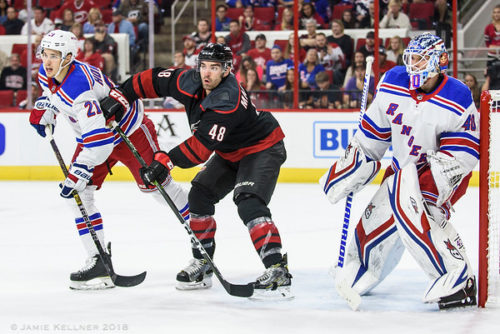Bret Hedican arrived in a 2002 deadline trade with the Florida Panthers. At the time, it seemed like the biggest part of the deal was unloading Sandis Ozolinsh and the remaining three years at $5M per year. Hedican stepped quickly into the Canes top 4 playing with Aaron Ward and immediately solidified the Canes blue line that was instrumental in making the 2001-02 playoffs. That Hurricanes team ran all the way to the Stanley Cup Finals before being defeated by the Detroit Red Wings.
The obvious visual memory of Bret Hedican is his skating. As one of the best and fastest skaters in Canes history, fans who watched him should be able to easily picture #6 and his powerful and smooth strides eating up chunks of ice rapidly and with ease. This speed was a key component of his success in a shutdown role for many years in a Canes uniform. Another maybe more hidden visual of Bret Hedican is him as a true hockey warrior. In his mid-30s and having logged 15+ years of ice time in the NHL, his last couple years in a Canes uniform were at times challenging. From a fan perspective, you hear terms like “injury prone,” “unable to stay healthy” and similar bandied about casually. But behind the scenes there was a Bret Hedican who seemed to log as much time with the trainers in his last couple seasons in Raleigh and did everything he possibly could to get on the ice for his teammates.
On the ice and a bit earlier, he played in the top 4 defensively on two great Canes teams. First in the 2002 playoffs noted above, he was part of a Canes defense that was air tight defensively and held to close games that could be, and usually were, won with late heroics. He notched only one goal and four assists in 23 playoff games that year but was a stalwart on defense. Then in the 2006 playoffs, he partnered with Mike Commodore to make up half of a top 4 on defense that was light on star power but heavy on quality play. Hedican played probably his best hockey as a Hurricane under the greatest of pressure in those 2006 playoffs and led the no-name blue line. He finished first amongst Canes defensemen in ice time averaging 22:40 per game and second in scoring behind only Frantisek Kaberle. In those playoffs, he easily eclipsed scoring expectations given his stay-home style of play collecting two goals and nine assists in 25 playoff games. His list of big plays included two game-tying assists and one game-tying goal in the last ten minutes of the third period setting up some of the overtime thrillers plus an assist on an overtime-winner, a second period game-winning goal and an assist on Justin Williams’ empty-netter to claim the Stanley Cup. Put more simply when the Canes were winning and celebrating in the 2006 playoffs, Bret Hedican was very often on the ice for it. The 2006 playoffs culminated with Hedican in a leadership role on the Canes blue line and finally etching his name on the Stanley Cup after 15 years in the NHL. It is fitting to close a Bret Hedican bio of sorts with his regular season statistics because that is about where they rank in measuring his contribution to the team relative to more important points above. Hedican logged 369 with the Canes and collected 19 goals and 82 assists on his way to easily claiming a spot amongst the greats in team history.



